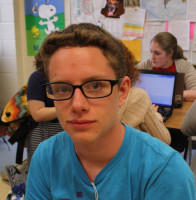Flaws found in broad district web filter
December 13, 2012
Confused why certain websites at school are blocked? Well, so are Minneapolis Public Schools officials and the makers of the program that blocks these websites. A month ago, Southerner writers tried to access articles they had written a year ago, one about transgender youth and another about gangs, but they found that their articles were blocked. The screen that popped up explained that the articles were blocked because of the keywords “transgender” and “gang.”
After contacting Benjamin Peck, the technical operations manager for Minneapolis Public Schools, Southerner staff were told it would be taken care of, and quickly afterward the articles were unblocked. But it is unclear whether the larger problem of needlessly blocked keywords has been fixed in the district’s attempt to adhere to a law.
In 2000, the Children’s Internet Protection Act (CIPA) was enacted by Congress to protect children from inappropriate content on the web. CIPA requires all public schools and libraries to block or filter Internet access to content that is obscene, child pornography, or harmful to minors. When this act was passed, all public school districts including Minneapolis Public Schools were required to purchase some sort of web filter. They could choose to purchase any web filter but almost all have ended up with the national internet security company iBoss.
When CIPA was enacted, school districts were told that if they didn’t get an Internet filter soon they would lose funding from the state. Many school districts, including Minneapolis Public School, installed iBoss, a program which mass-blocks websites based on “inappropriate” content. The program used keywords to determine whether or not the content is inappropriate. In some cases, including Minneapolis Public Schools, these keywords were not examined before put in use.
“iBoss is designed to expand education in the classroom,” said iBoss CEO Peter Martini, adding that the company’s web filters serve as a good example of education and technology being mixed in the classroom.
Students are concerned, however, that education may actually be made more difficult when particular keywords are blocked.
MPS’s Benjamin Peck wrote in an email, “All of the keywords were configured as blocked and came from the default configuration of the iBoss filtering policy.” But when iBoss was contacted Martini said that “iBoss does not create a program, but an appliance that lets schools block websites. The school districts choose what sites to block.”
One change iBoss has made to their program as a result of the ACLU interest is an immediate unblock action teachers can take. “Teachers can ask [for a site] to be unblocked if they think the site is appropriate,” said Brent Larson, South’s Computer Technician. “All they have to do is send an email and the site will be unblocked the same day.”
Although this addition is helpful for specific sites, it does not fix the problem that certain keywords can inhibit students from doing necessary research.
South’s media specialist Deb Snell understands the problem but defends the blocks. “These blocks occasionally inhibit the ability to access school appropriate websites,” said Snell, “but they are not deliberate censorship.” Snell then explained that some sites might be blocked because of inappropriate ads, and not because of the actual content of the sites.
While neither iBoss nor the Minneapolis Public School district acknowledge choosing what words to block, when asked for a list of blocked words, iBoss spokesperson Marisa Salzman replied, “Unfortunately, due to the nature of these words, we cannot provide them. Many of these words can be explicit.” This is contradictory to the iBoss CEO’s statement that they had no control over what is blocked.
The confusion surrounding what Internet search words are blocked, and who decides what these words are, continues unresolved, potentially keeping students from accessing sites on the internet that relate to issues happening in their lives or to academic subjects they are researching.





